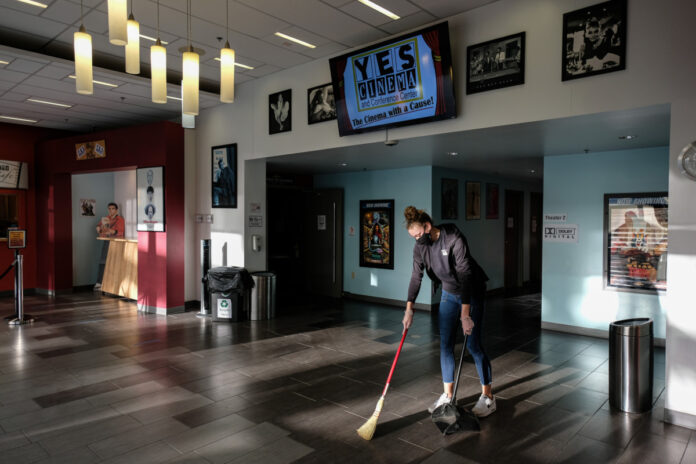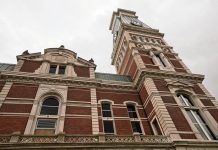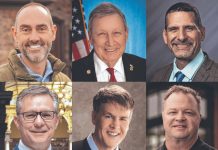
COLUMBUS, Ind. — COVID-19’s impact has been so dramatic on the nonprofit Lincoln-Central Neighborhood Family Center’s operations that at least one its two leading staffers and oftentimes both have been in the office seven days per week for the past year.
In fact, Wednesday marks the one-year anniversary of such an uptick in demand for the center’s broad range of social service help among Columbus’ most impoverished and vulnerable residents, and others as well since the virus struck.
“That’s not one single day off,” said Randy Allman, the center’s executive director, emphasizing that he hardly is complaining and is not saying that all nonprofits should or could do such. “That’s because COVID hasn’t taken a day off. COVID hasn’t taken a vacation. COVID hasn’t taken a holiday.
“We’ve just felt that what we’re doing is absolutely essential.”
To make matters more challenging, the center’s downtown YES Cinema and Conference Center — the facility that in recent years has generated $20,000 to $50,000 in annual profits for the center’s work on behalf of the struggling — has operated in the red since a year ago because of closures and the novel coronavirus that has kept away many movie buffs, despite extensive cleaning and safety procedures.
Lincoln-Central staff’s key work, including helping its downtown area residents and others with everything from utilities assistance to groceries since last spring, is among local nonprofits that got a boost from federal Paycheck Protection Program funds last year. The center got $41,500 for general operating expenses, without a need to pay back the money because the center, like many others, filed for financial forgiveness.
“That helped us big time,” Allman said. “ … We’ve seen some people who have been in despair. To think that maybe we would not have been there some Saturday or Sunday when they were struggling with the most angst — well, that would have been something difficult for us to live with.”
All told, Lincoln-Central saw its overall advocacy, resource and referral up by 1,000 more contacts in 2020 than in 2019.
Diane Doup, the center’s community outreach coordinator, praised both The Heritage Fund — the Community Foundation of Bartholomew County and Old National Bank and other local financial institutions for helping local nonprofits file for Paycheck Protection assistance.
The Columbus Area Visitors Center received $126,250 in such funds, according to Karen Niverson, the center’s executive director. That money helped the center retain its core, full-time staff of eight people.
“We’ve got a really good team,” Niverson said.
Because of an 80 percent decrease in overall tours last year, the center furloughed eight part-time tour drivers and one full-time staff member, Niverson said.
“When you’re down 80 percent, you can really tell how quiet things were,” she said.
She said the center hopes to bring back all those staffers by mid-summer if COVID cases continue to decrease and tours can be scheduled again.
The nonprofit Heritage Fund received $90,500 in the form of a forgivable loan as part of the Paycheck Protection Program, according to Tracy Souza, foundation president and chief executive officer. She called the aid, which she sees as similar to a small business loan, revolutionary for nonprofits.
“We spent a lot of time just encouraging other local nonprofits — and not just the biggest ones — to complete the paperwork,” Souza said.
She labeled the assistance of local banks with nonprofits as “fantastic.” Moreover, she added that such help loomed large especially in light of the fact that a number of other Indiana foundation leaders told her that that special effort did not surface in many other locales, because many lenders were tending to their for-profit customers first.
Without the money, Souza said the foundation would have had to consider trimming staff — six full-time and one part-time — or temporarily reducing salaries during the early portion of the pandemic.
“Those would have been the only (financially) meaningful triggers that I could have pulled,” Souza said.




